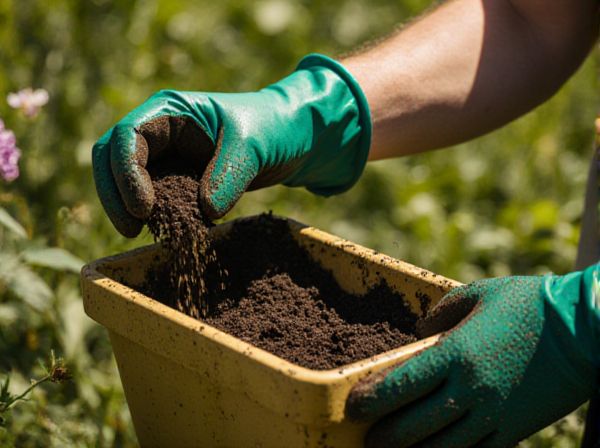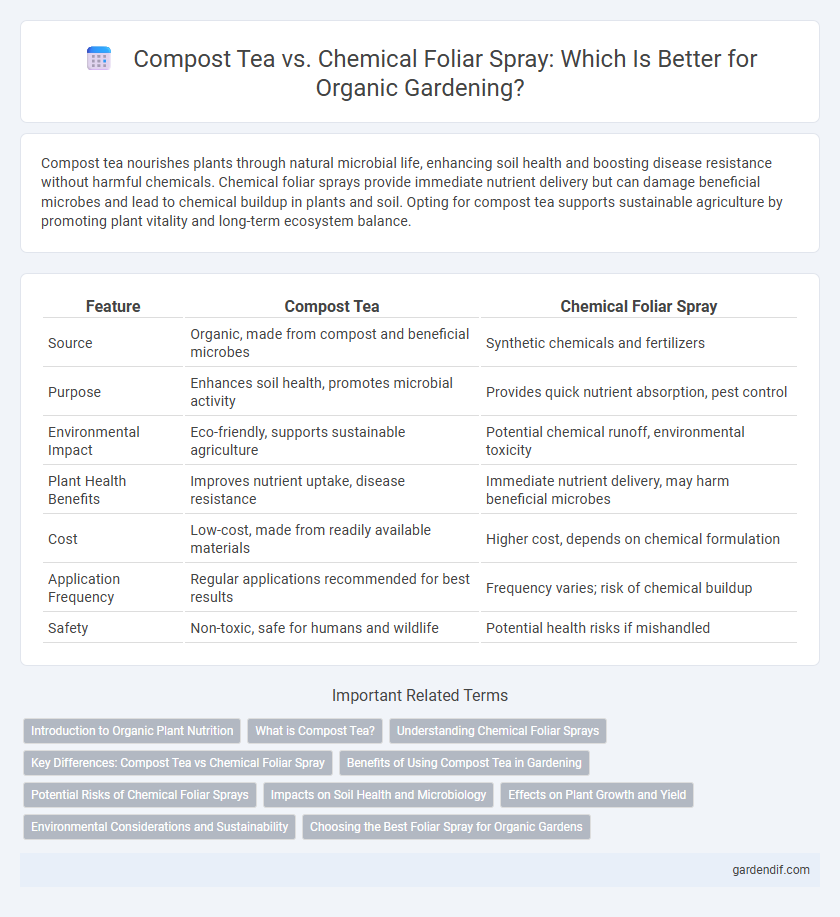
Compost tea vs Chemical foliar spray Illustration
Compost tea nourishes plants through natural microbial life, enhancing soil health and boosting disease resistance without harmful chemicals. Chemical foliar sprays provide immediate nutrient delivery but can damage beneficial microbes and lead to chemical buildup in plants and soil. Opting for compost tea supports sustainable agriculture by promoting plant vitality and long-term ecosystem balance.
Table of Comparison
| Feature | Compost Tea | Chemical Foliar Spray |
|---|---|---|
| Source | Organic, made from compost and beneficial microbes | Synthetic chemicals and fertilizers |
| Purpose | Enhances soil health, promotes microbial activity | Provides quick nutrient absorption, pest control |
| Environmental Impact | Eco-friendly, supports sustainable agriculture | Potential chemical runoff, environmental toxicity |
| Plant Health Benefits | Improves nutrient uptake, disease resistance | Immediate nutrient delivery, may harm beneficial microbes |
| Cost | Low-cost, made from readily available materials | Higher cost, depends on chemical formulation |
| Application Frequency | Regular applications recommended for best results | Frequency varies; risk of chemical buildup |
| Safety | Non-toxic, safe for humans and wildlife | Potential health risks if mishandled |
Introduction to Organic Plant Nutrition
Compost tea enhances organic plant nutrition by delivering beneficial microorganisms and nutrients that improve soil health and plant immunity. Chemical foliar sprays provide immediate nutrient absorption but often lack the sustainability and soil enrichment capabilities found in organic compost tea. Integrating compost tea supports long-term soil fertility and reduces dependency on synthetic chemicals, promoting a holistic approach to plant nutrition.
What is Compost Tea?
Compost tea is a nutrient-rich liquid derived from steeping aerated compost in water, teeming with beneficial microorganisms that enhance plant growth and soil health. This organic solution delivers essential nutrients and promotes microbial activity, improving nutrient uptake and disease resistance. Unlike chemical foliar sprays, compost tea supports sustainable agriculture by fostering natural soil ecosystems without harmful residues.
Understanding Chemical Foliar Sprays
Chemical foliar sprays contain synthetic nutrients and pesticides designed for rapid absorption through plant leaves, offering immediate but often short-term nutrient delivery and pest control. These sprays can lead to chemical residues on crops, potential phytotoxicity, and environmental contamination, raising concerns about soil health and long-term sustainability. Understanding the specific composition and application timing is crucial to minimizing negative impacts and ensuring effective plant response.
Key Differences: Compost Tea vs Chemical Foliar Spray
Compost tea enhances plant health by introducing beneficial microorganisms and organic nutrients that improve soil microbiome and nutrient uptake, while chemical foliar sprays provide targeted, synthetic nutrient delivery or pest control with immediate effects but lack long-term soil benefits. Compost tea supports sustainable agriculture practices by promoting natural disease resistance and soil fertility without synthetic residues, whereas chemical sprays can cause environmental harm, potential toxicity, and resistance buildup in pests. The choice between compost tea and chemical foliar sprays impacts crop quality, ecological balance, and overall soil health, favoring organic approaches for regenerative farming systems.
Benefits of Using Compost Tea in Gardening
Compost tea enriches plants with beneficial microorganisms that enhance nutrient uptake and improve soil health, unlike chemical foliar sprays that primarily provide a quick nutrient boost without supporting long-term soil vitality. This organic solution strengthens plant immunity against diseases while promoting sustainable growth and reducing the risk of chemical residues on crops. Using compost tea aligns with eco-friendly gardening practices, fostering a balanced ecosystem in the garden environment.
Potential Risks of Chemical Foliar Sprays
Chemical foliar sprays often contain synthetic pesticides and fertilizers that can harm beneficial microorganisms and lead to soil degradation. Exposure to these chemicals poses health risks to humans, including respiratory issues and skin irritation. Overuse may also contribute to pest resistance, reducing long-term effectiveness and increasing environmental toxicity.
Impacts on Soil Health and Microbiology
Compost tea enhances soil health by introducing beneficial microorganisms that improve nutrient cycling and suppress harmful pathogens, fostering a balanced and dynamic soil microbiome. Chemical foliar sprays often disrupt soil microbial communities by leaving residues that reduce microbial diversity and hinder natural soil processes. Long-term reliance on compost tea supports sustainable soil fertility, whereas chemical sprays can degrade soil structure and microbiological function over time.
Effects on Plant Growth and Yield
Compost tea enhances plant growth by supplying beneficial microbes that improve nutrient uptake and strengthen plant immunity, leading to increased crop yield and healthier plants. Chemical foliar sprays provide immediate nutrient supplementation but may cause soil degradation and reduce microbial diversity over time, potentially impacting long-term productivity. Studies show that organic compost tea supports sustainable growth cycles, promoting higher-quality harvests compared to conventional chemical foliar treatments.
Environmental Considerations and Sustainability
Compost tea enhances soil health by promoting beneficial microbial activity, reducing the need for synthetic fertilizers and minimizing chemical runoff that can harm ecosystems. Chemical foliar sprays often contain harmful pollutants that contribute to soil degradation and water contamination, posing long-term risks to biodiversity and environmental balance. Sustainable agriculture increasingly favors compost tea as an eco-friendly alternative that supports natural nutrient cycling and reduces dependence on non-renewable chemical inputs.
Choosing the Best Foliar Spray for Organic Gardens
Compost tea enriches plants with natural microbes and nutrients, promoting soil health and disease resistance in organic gardens. Chemical foliar sprays may provide quick nutrient delivery but often contain synthetic ingredients harmful to beneficial organisms and the environment. Selecting compost tea supports sustainable growth, aligning with organic gardening principles and enhancing long-term plant vitality.
Compost tea vs Chemical foliar spray Infographic

 gardendif.com
gardendif.com